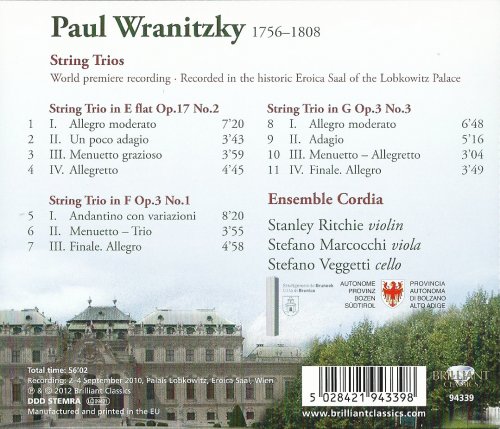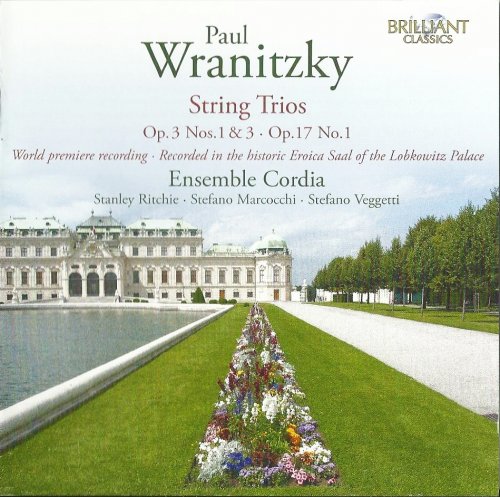
Ensemble Cordia - Paul Vranický: String Trios (2012)
BAND/ARTIST: Ensemble Cordia
- Title: Paul Vranický: String Trios
- Year Of Release: 2012
- Label: Brilliant Classics
- Genre: Classical
- Quality: FLAC (image+.cue,log,scans)
- Total Time: 55:57
- Total Size: 287 Mb
- WebSite: Album Preview
Tracklist:
Pavel Vranický (1756-1808)
01. String Trio in E flat major - I. Allegro moderato [0:07:20.18]
02. String Trio in E flat major - II. Un poco adagio [0:03:43.66]
03. String Trio in E flat major - III. Menuetto grazioso [0:03:59.15]
04. String Trio in E flat major - IV. Allegretto [0:04:45.18]
05. String Trio in F major - I. Andantino con variazioni [0:08:20.48]
06. String Trio in F major - II. Menuetto - Trio [0:03:55.60]
07. String Trio in F major - III. Finale. Allegro [0:04:58.54]
08. String Trio in G major - I. Allegro moderato [0:06:48.24]
09. String Trio in G major - II. Adagio [0:05:16.09]
10. String Trio in G major - III. Menuetto - Allegretto [0:03:04.39]
11. String Trio in G major - IV. Finale. Allegro [0:03:49.43]
Performers:
Ensemble Cordia

Pavel Vranický (1756-1808)
01. String Trio in E flat major - I. Allegro moderato [0:07:20.18]
02. String Trio in E flat major - II. Un poco adagio [0:03:43.66]
03. String Trio in E flat major - III. Menuetto grazioso [0:03:59.15]
04. String Trio in E flat major - IV. Allegretto [0:04:45.18]
05. String Trio in F major - I. Andantino con variazioni [0:08:20.48]
06. String Trio in F major - II. Menuetto - Trio [0:03:55.60]
07. String Trio in F major - III. Finale. Allegro [0:04:58.54]
08. String Trio in G major - I. Allegro moderato [0:06:48.24]
09. String Trio in G major - II. Adagio [0:05:16.09]
10. String Trio in G major - III. Menuetto - Allegretto [0:03:04.39]
11. String Trio in G major - IV. Finale. Allegro [0:03:49.43]
Performers:
Ensemble Cordia
Probably a student of Haydn, definitely a Masonic brother of Mozart, and the conductor of the premiere of Beethoven's 1st Symphony, Pavel Vranicky (1756-1808) was a man about Vienna at the height of the Classical era. AKA Paul Wranitzky, he was also a prolific composer. 10 operas, at least 44 symphonies , perhaps as many as 73 string quartets, string quintets, trios and duets, chamber music for various combinations of winds, piano and strings - all flowed from his pen. Trained as a violinist, he found his first opportunity to compose when he was appointed as music director of the court of Count Johann Esterhazy, a distant cousin to Haydn's patron.
These 3 string trios were written between 1785 and the early 1790's. Unlike previous excursions into the genre which employed two violins and a cello , Vranicky's replace one violin with a viola.
From the opening bars of the 'Allegro moderato' of the first trio, Op.17, No.2 in B flat, the viola assumes the melody while the top voice supplies a skipping counter melody and the cello just the barest of accompaniment. Often sounding more like a violin-viola duet, this 1st movement comes to gentle conclusion after some intricate passage work by the cello,.
The remaining three movements are all in triple meter. The 2nd movement 'Adagio' features a series of delicate figures lightly tripping down the scale. A sweeping 'Minuetto graziano' follows, with the contrasting trio led by the viola while the violin provides soft repeated notes as accompaniment. The concluding 'Allegretto' showcases all three voices as the dancing melody is shared equitably, dipping briefly into minor before returning for the sunny, spirited ending.
In F Major, the beginning 'Andantino con variazioni' of Op.1, No.5 opens with a prayerful theme.
A flamboyant violin drives the first 2 variations while the viola sparkles in 2nd pair. The variations for cello are written in the uppermost register and require virtuosic technique which Stefano Vegetti readily provides. An elegant 'Minuetto' follows. The trio shifts into minor, with hushed repeated notes in the bass line propelling this 2nd movement. This work, the only 3 movement composition on the recording, concludes with a vigorous 'Allegro'. Led by the violin, this finale features particularly muscular playing from all three instruments.
Op.3, No.3, the closing trio is written in G Major. A bright 'Allegro moderato' presents the main theme in the viola. The violin soon enters and takes over the melodic responsibility, soaring high on the E string. After returning to earth, the top voice trades lines back and forth with the viola while the cello is relegated to a supporting role for much of this 1st movement. In the wistful 'Adagio' that follows, the bass voice assumes the central character, so much so that it often sounds like a cello concerto before the violin draws the movement to a gentle conclusion.
In the triple metered 'Minuetto-Allegretto', the violin skips playfully along, engaging in a wonderfully impish exchange with the cello. The 4th movement 'Allegro' is a rustic dance with lots of country fiddling, delivered with an infectious exuberance. After a brief contemplative interlude in minor, the bucolic theme returns for rollicking ending.
The bright, almost crystalline engineering by Brilliant Classics is excellent, the final notes echoing long into the silence following the ending phases. The skillful work by Ensemble Cordia is a plus, particularly the violinist Stanley Ritchie. This world premier recording offers an easy entrance into Pavel Vranicky's chamber works for strings. While they may not have the depth of his string quartets, they provide a charming example of the elegance that epitomizes the high Viennese classical style.
These 3 string trios were written between 1785 and the early 1790's. Unlike previous excursions into the genre which employed two violins and a cello , Vranicky's replace one violin with a viola.
From the opening bars of the 'Allegro moderato' of the first trio, Op.17, No.2 in B flat, the viola assumes the melody while the top voice supplies a skipping counter melody and the cello just the barest of accompaniment. Often sounding more like a violin-viola duet, this 1st movement comes to gentle conclusion after some intricate passage work by the cello,.
The remaining three movements are all in triple meter. The 2nd movement 'Adagio' features a series of delicate figures lightly tripping down the scale. A sweeping 'Minuetto graziano' follows, with the contrasting trio led by the viola while the violin provides soft repeated notes as accompaniment. The concluding 'Allegretto' showcases all three voices as the dancing melody is shared equitably, dipping briefly into minor before returning for the sunny, spirited ending.
In F Major, the beginning 'Andantino con variazioni' of Op.1, No.5 opens with a prayerful theme.
A flamboyant violin drives the first 2 variations while the viola sparkles in 2nd pair. The variations for cello are written in the uppermost register and require virtuosic technique which Stefano Vegetti readily provides. An elegant 'Minuetto' follows. The trio shifts into minor, with hushed repeated notes in the bass line propelling this 2nd movement. This work, the only 3 movement composition on the recording, concludes with a vigorous 'Allegro'. Led by the violin, this finale features particularly muscular playing from all three instruments.
Op.3, No.3, the closing trio is written in G Major. A bright 'Allegro moderato' presents the main theme in the viola. The violin soon enters and takes over the melodic responsibility, soaring high on the E string. After returning to earth, the top voice trades lines back and forth with the viola while the cello is relegated to a supporting role for much of this 1st movement. In the wistful 'Adagio' that follows, the bass voice assumes the central character, so much so that it often sounds like a cello concerto before the violin draws the movement to a gentle conclusion.
In the triple metered 'Minuetto-Allegretto', the violin skips playfully along, engaging in a wonderfully impish exchange with the cello. The 4th movement 'Allegro' is a rustic dance with lots of country fiddling, delivered with an infectious exuberance. After a brief contemplative interlude in minor, the bucolic theme returns for rollicking ending.
The bright, almost crystalline engineering by Brilliant Classics is excellent, the final notes echoing long into the silence following the ending phases. The skillful work by Ensemble Cordia is a plus, particularly the violinist Stanley Ritchie. This world premier recording offers an easy entrance into Pavel Vranicky's chamber works for strings. While they may not have the depth of his string quartets, they provide a charming example of the elegance that epitomizes the high Viennese classical style.

Classical | FLAC / APE | CD-Rip
As a ISRA.CLOUD's PREMIUM member you will have the following benefits:
- Unlimited high speed downloads
- Download directly without waiting time
- Unlimited parallel downloads
- Support for download accelerators
- No advertising
- Resume broken downloads


